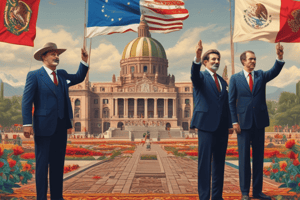Podcast
Questions and Answers
What principle dictates that laws should only apply to future actions and not past actions?
What principle dictates that laws should only apply to future actions and not past actions?
- Ex post facto
- Consent
- Sovereignty
- Prospectivity (correct)
Which of the following authors believed in the necessity of revolting only in rare cases?
Which of the following authors believed in the necessity of revolting only in rare cases?
- Thomas Jefferson
- Jonathan Boucher (correct)
- John Adams
- Benjamin Franklin
Which act imposed the first direct tax on the colonies by Parliament?
Which act imposed the first direct tax on the colonies by Parliament?
- Navigation Acts
- Quartering Act
- Stamp Act (correct)
- Tea Act
What section of the Declaration of Independence outlines when a government should be overthrown?
What section of the Declaration of Independence outlines when a government should be overthrown?
What document marked the beginning of Parliament's sovereignty over the monarchy?
What document marked the beginning of Parliament's sovereignty over the monarchy?
What does liberalism primarily value?
What does liberalism primarily value?
Which key value raises the question of whether inequality is acceptable?
Which key value raises the question of whether inequality is acceptable?
How does Aristotle view justice?
How does Aristotle view justice?
What is the primary concern of libertarianism?
What is the primary concern of libertarianism?
What does the collective action problem illustrate?
What does the collective action problem illustrate?
What was Roger Williams' argument regarding church and state?
What was Roger Williams' argument regarding church and state?
What concept does John Cotton emphasize regarding authority?
What concept does John Cotton emphasize regarding authority?
How do Roger Williams and John Cotton differ fundamentally?
How do Roger Williams and John Cotton differ fundamentally?
What principle emphasizes that government derives its authority from the governed?
What principle emphasizes that government derives its authority from the governed?
What was Thomas Paine's stance on hereditary monarchy as expressed in 'Common Sense'?
What was Thomas Paine's stance on hereditary monarchy as expressed in 'Common Sense'?
In her correspondence with John Adams, what concern did Abigail Adams express about male authority?
In her correspondence with John Adams, what concern did Abigail Adams express about male authority?
What aspect did Thomas Jefferson acknowledge as a barrier to multi-racial society in his 'Notes on the State of Virginia'?
What aspect did Thomas Jefferson acknowledge as a barrier to multi-racial society in his 'Notes on the State of Virginia'?
What argument did Benjamin Banneker present to Thomas Jefferson regarding race?
What argument did Benjamin Banneker present to Thomas Jefferson regarding race?
What motivates individuals to make exchanges in a market according to traditional economic assumptions?
What motivates individuals to make exchanges in a market according to traditional economic assumptions?
What is the primary benefit of specialization in production?
What is the primary benefit of specialization in production?
What does the concept of the 'invisible hand' suggest about market economies?
What does the concept of the 'invisible hand' suggest about market economies?
According to economic principles, what is a key assumption about people's behavior in markets?
According to economic principles, what is a key assumption about people's behavior in markets?
What role does government play in a market economy?
What role does government play in a market economy?
How did Adam Smith's views on specialization differ from those of Cotton Mather?
How did Adam Smith's views on specialization differ from those of Cotton Mather?
What is a potential cost of specialization in production?
What is a potential cost of specialization in production?
What does the example of the Mayflower Compact illustrate about governance?
What does the example of the Mayflower Compact illustrate about governance?
What was a significant outcome of the Battles of Trenton and Princeton?
What was a significant outcome of the Battles of Trenton and Princeton?
What was Elizabeth Cady Stanton's purpose in using the language of the Declaration in the Seneca Falls Declaration?
What was Elizabeth Cady Stanton's purpose in using the language of the Declaration in the Seneca Falls Declaration?
What concept does John Rawls' 'veil of ignorance' thought experiment promote?
What concept does John Rawls' 'veil of ignorance' thought experiment promote?
According to Sojourner Truth, what contradiction exists regarding the perceptions of women and slaves?
According to Sojourner Truth, what contradiction exists regarding the perceptions of women and slaves?
What is the philosophical idea that Plato promoted regarding leadership?
What is the philosophical idea that Plato promoted regarding leadership?
Study Notes
Political Traditions
- Liberalism: Values individual liberty and limited government, often at the expense of community.
- Republicanism: Prioritizes community and active government, potentially sacrificing individual freedoms.
Key Values of Society
- Freedom: Defining the limits of freedom is a persistent challenge.
- Virtue: Debates arise over whether individual choice or government dictates virtue.
- Welfare (Prosperity): Promoting economic well-being and addressing the issue of inequality are crucial concerns.
Aristotle's Philosophy
- Justice is Teleological: Justice is determined by the purpose or "telos" of society.
- Justice is Honorific: Those best suited for a role should be entrusted with it, based on virtue.
- Politics Cultivates Virtue: The aim of politics is to foster a virtuous society.
- Leadership: The most capable individuals should lead society to achieve its telos.
- Ancient Liberty: Emphasizes community and virtue over individual preferences, potentially limiting individual rights.
Libertarianism
- Individual Preferences: Prioritizes the satisfaction of individual desires over societal goals or virtue.
- Minimal State: Advocates for minimal government intervention.
Collective Action Problem
- Cooperation: The conflict between individual interests and collective benefits can hinder cooperation.
- Overcoming Barriers: Strategies to promote cooperation include selective incentives, political entrepreneurship, shared ideologies, and coercion.
Roger Williams
- Separation of Church and State: Advocated for distinct civil and religious authority.
- Freedom of Conscience: Believed in individual religious freedom without government coercion.
John Cotton
- Ordered Liberty: Advocated for boundaries within both governance and individual behavior.
Williams vs. Cotton
- Human Nature: Williams leans more towards republicanism with a focus on community, while Cotton leans towards liberalism, emphasizing individual liberty.
- Progression: Both Williams and Cotton eventually shifted toward liberalism.
Markets and Economic Concepts
- Value of Markets: Highlights the importance of free markets.
- Self-Interest: Emphasizes self-interest as the driving force behind economic exchange.
- Specialization and Comparative Advantage: Individuals specialize in tasks where they have the lowest opportunity cost, leading to:
- Full employment of resources
- Maximized exchange gains
- Economic interdependence
Invisible Hand
- Unintended Consequences: Individuals acting in their own self-interest can indirectly benefit society.
Government Role in Markets
- Protection: Preventing coercion, fraud, and the violation of property rights.
- Infrastructure: Providing transportation and communication networks.
- Regulation: Defining property rights, enforcing agreements, and providing a stable monetary system.
Gene Sperling
- Virtue in Competition: Advocates for government policies that encourage virtuous behavior within the economy.
- Rule of Law: Emphasizes the importance of economic regulations in shaping economic outcomes.
Mayflower Compact
- Social Contract: An early example of self-governance based on a social contract.
Cotton Mather
- Work as Devotion: Labor is a way to glorify God and serve others.
Mather vs. Adam Smith
- Common Ground: Both valued specialization.
- Difference: Adam Smith emphasized self-interest as the primary driver of economic activity.
Roger Williams, John Winthrop, and John Cotton
- Roger Williams: Emphasized religious conscience and individual choice, advocating for church-state separation.
- John Winthrop: Championed "city on a hill" ideals and both civil and natural liberty.
- John Cotton: Insisted on clear boundaries and obedience to God's commandments.
Key Concepts
- Prospectivity: Laws should only apply to future actions, not past ones (ex post facto).
- Consent: Laws should be generally acceptable to those governed.
Benjamin Franklin
- Self-Made Man: Argued that liberty is achieved through reason and hard work.
Jonathan Boucher
- Obedience and Revolt: Emphasized obedience to God's laws, permitting revolt only in rare circumstances.
Glorious Revolution
- Shift in Sovereignty: Parliament gained power over the monarchy, resulting in the English Bill of Rights.
Colonial Conflicts
- Lack of Representation: Colonists lacked direct representation in Parliament.
- Economic Tensions: Mercantilist policies imposed by Britain, including navigation acts, taxes, and trade restrictions, fueled colonial resentment.
Colonial Response
- Committees of Correspondence: Organized communication and coordination among the colonies.
- Continental Congress: A forum for colonial cooperation and resistance.
Declaration of Independence
- Author: Written by Thomas Jefferson.
- Purpose: To articulate American ideals and justify the separation from Britain.
- Foundational Principles:
- Natural Rights
- Equality
- Consent of the Governed.
- Sections: Outlined grievances, justification for revolution, and a declaration of independence.
- Key Declarations: Right of revolution, power of the people, natural rights, equality, and the foundation of a new nation.
Thomas Paine, "Common Sense"
- Advocacy: Argued for independence from British rule.
- Critique of Monarchy: Rejected hereditary monarchy and supported constitutional government.
Abigail Adams and John Adams Correspondence
- Abigail Adams: Advocated for women's rights, highlighting the need for equality and consent.
- John Adams: Recognized the revolution's challenge to traditional authority but believed it had limits.
- Abigail's Rejoinder: Argued that women possessed agency and power to secure their own freedom.
Thomas Jefferson, "Notes on the State of Virginia"
- Equality: Jefferson's belief in equality was limited by his views on racial differences.
Benjamin Banneker and Thomas Jefferson Correspondence
- Banneker's Argument: Challenged Jefferson's views on racial equality, asserting the shared humanity and rights of Black people.
- Jefferson's Response: Did not fully endorse a universal understanding of liberty and rights.
Battles of Trenton and Princeton
- Turning Points: Significant victories for the American forces, boosting morale and encouraging enlistments.
- French Support: These victories led to increased French support for the American cause.
Slaves' Petition to Thomas Gage
- Natural Rights and Religion: Argued that slavery violated natural rights and divine principles.
- Freedom and Unity: Pledged for family unity and freedom in a land promised by God.
Elizabeth Cady Stanton, "Seneca Falls Declaration of Sentiments"
- Model for Independence: Stanton deliberately mimicked the language of the Declaration of Independence to highlight the injustice faced by women.
Sojourner Truth, "Ain't I a Woman?"
- Ability and Equality: Emphasized her hard work and contributions as a woman, arguing for equal treatment.
- Double Standard: Challenged the double standard that deemed women and slaves inferior yet expected them to perform essential tasks.
Plato
- Philosopher Kings: Proposed a society ruled by those with the most wisdom and virtue.
Jean-Jacques Rousseau
- Human Nature: Argued that humans are inherently good but can be corrupted by societal influences.
John Rawls
- Veil of Ignorance: A thought experiment proposing a society structured based on fairness and justice, where individuals would create a just society without knowing their own position or advantages.
Studying That Suits You
Use AI to generate personalized quizzes and flashcards to suit your learning preferences.
Related Documents
Description
Explore the contrasting political traditions of liberalism and republicanism, focusing on key societal values such as freedom, virtue, and welfare. Delve into Aristotle's philosophical insights on justice, leadership, and the cultivation of virtue within society.




